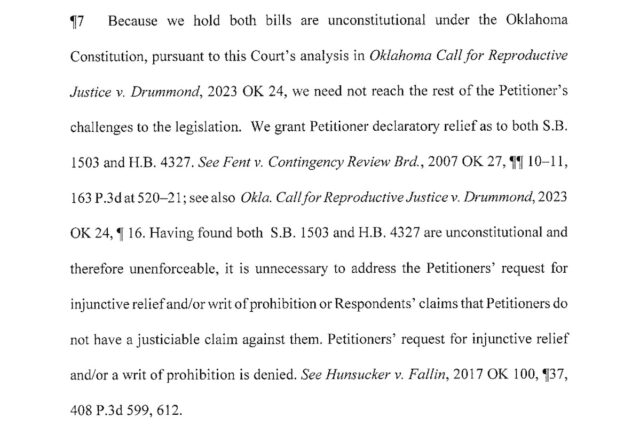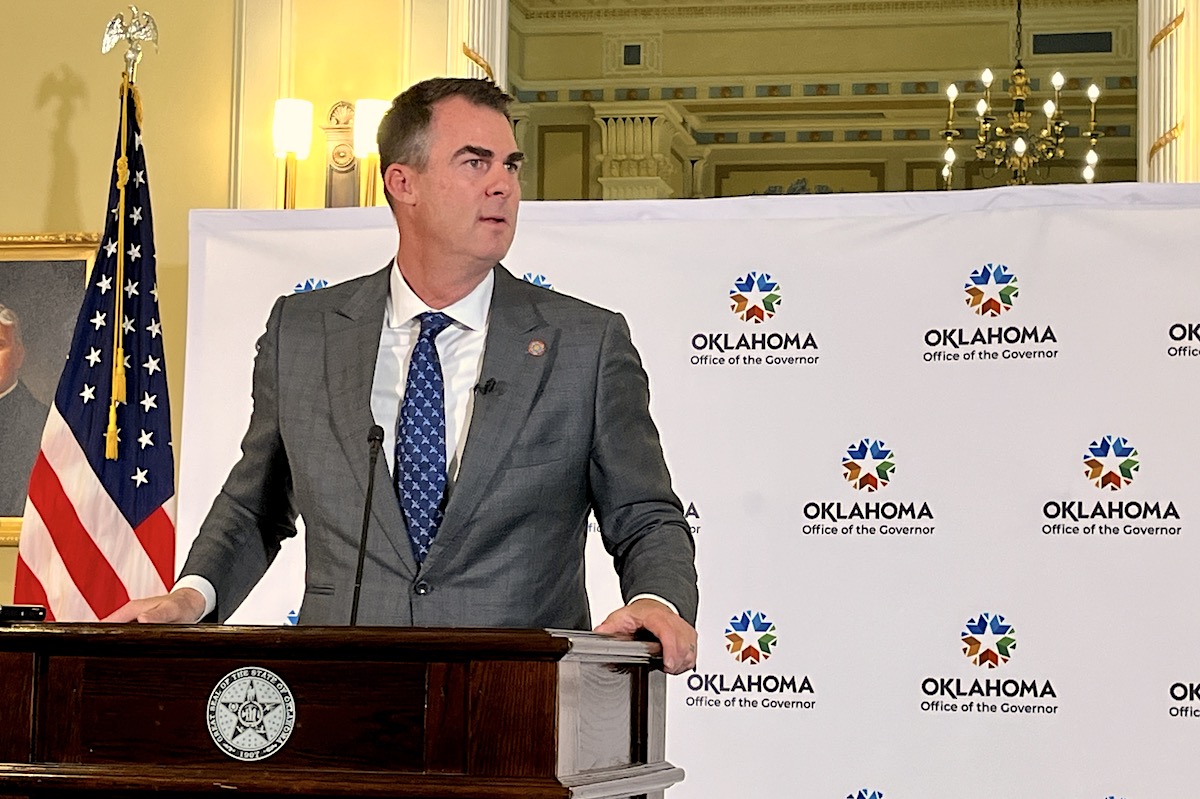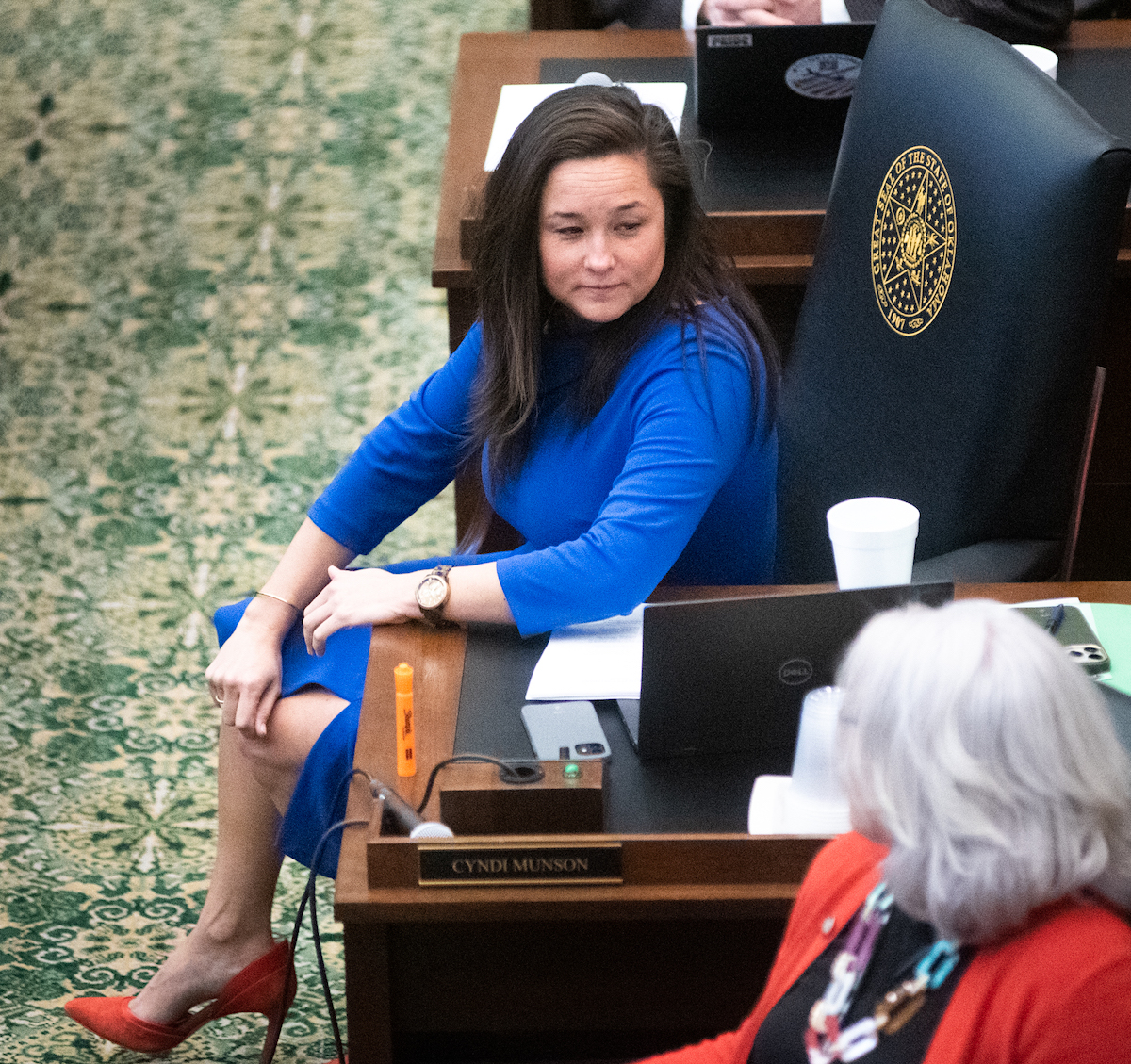

By a 6-3 decision released Wednesday, the Oklahoma Supreme Court ruled that a pair of bills passed by the Legislature in 2022 are unconstitutional, a second straight abortion-related decision from the court that has sparked harsh criticism from officials who favor abortion bans and cautious optimism from those who believe women should have access to such services.
Those bills, SB 1503 and HB 4327 were controversial at the time of their passage. SB 1503 created the “Oklahoma Heartbeat Act” and was signed by Gov. Kevin Stitt in April 2022. It made most abortions illegal if a physician detects a heartbeat in a fetus.
Meanwhile, HB 4327 allowed citizens to sue doctors who performed abortions.
Wednesday’s decision (embedded below) does not change Oklahoma’s larger criminal ban on abortion procedures, which stems from a 1910 law passed by the state Legislature. But the new decision comes about two months after the state’s Supreme Court ruled another anti-abortion statute unconstitutional because justices determined that two sections of the Oklahoma Constitution guarantee a woman’s right to abortion if her life is in danger.
“Pursuant to this court’s decision in Oklahoma Call for Reproductive Justice v. Drummond (…) finding an ‘inherent right of a pregnant woman to terminate a pregnancy when necessary to preserve her life,’ we find these two statutes to also be unconstitutional,” justices wrote in Wednesday’s majority opinion. “SB 1503 provides even more extreme language than [the section of law] found unconstitutional in Oklahoma Call for Reproductive Justice v. Drummond, as such, under stare decisis this court must also
find SB 1503 unconstitutional.”
Justices Yvonne Kauger, James Winchester, James Edmondson, Doug Combs, Norma Gurich and Richard Darby supported the majority decision. Chief Justice John Kane IV, Vice Chief Justice Dustin Rowe and Justice Dana Kuehn dissented.
In concurring with the majority, Darby specified that he was joining the other five justices under the stare decisis doctrine, a Latin phrase meaning “to stand by things decided.”
Darby had dissented in March when the court ruled 5-4 that the Oklahoma Constitution guarantees a right to abortion when the mother’s life is in danger. That ruling said inconsistent definitions in state statute necessitated justices’ determination that two portions of Article II of the Constitution guarantee women access to abortion services in those instances:
- Section 2 establishes the “inherent right to life, liberty, the pursuit of happiness and the enjoyment of the gains of their own industry.”
- Section 7 states no person shall be “deprived of life, liberty, or property, without due process of law.”
In both its March decision and its latest one Wednesday, the court declined to consider the broader questions about whether the Oklahoma Constitution contains additional rights to abortion.
“Having found both SB 1503 and HB 4327 are unconstitutional and therefore unenforceable, it is unnecessary to address the petitioners’ request for injunctive relief and/or writ of prohibition or respondents’ claims that petitioners do not have a justiciable claim against them,” justices wrote in the majority decision. “Petitioners’ request for injunctive relief’ and/or a writ of prohibition is denied.”
Stitt: Court ‘over-involved itself in the state’s democratic process’

In June 2022, the U.S. Supreme Court upended abortion access in many parts of the country by functionally overturning its 1973 decision in Roe v. Wade with a new decision in Dobbs v. Jackson. The Dobbs decision held that abortion access is a policy decision left up to individual states unless Congress approves national legislation on the topic.
Gov. Kevin Stitt, who has favored extreme restrictions on abortion access, criticized the Oklahoma Supreme Court’s decision Wednesday.
“I again wholeheartedly disagree with the Oklahoma Supreme Court’s use of activism to create a right to an abortion in Oklahoma,” Stitt said in a statement. “This court has once more over-involved itself in the state’s democratic process, and has interceded to undo legislation created by the will of the people. I agree with Justice Rowe’s dissent, ‘The issues presented in this matter are political questions, which are better resolved by the people via our democratic process.'”
Stitt pledged to continue working to restrict abortions in Oklahoma.
“As governor, I will continue to do my part to fight to protect the lives of the unborn,” he wrote. “From the moment life begins at conception, we have a responsibility to do everything we can to protect that baby’s life and the life of the mother. Oklahoma will keep working to be the most pro-family state in the nation.”
Planned Parenthood Great Plains CEO Emily Wales said the ruling is a step forward but doesn’t restore access to abortions for women in Oklahoma.
“This ruling, while providing clarity in emergency situations, does not change the landscape of care significantly,” she said in a statement. “But importantly, the court did strike down contradictory and unconstitutional laws that violate the rights of Oklahomans. While we are relieved the court upheld the right to abortion in medical emergencies, this does not diminish the fact that care remains out of reach for the majority of Oklahomans. We know firsthand the toll these unnecessary burdens place on our patients and we’ll continue to help those reach care when they need it most.”
Lawmakers offer contrasting views on the decision

Oklahoma House Minority Leader Cyndi Munson (D-OKC) said medical decisions should remain between patients and doctors, not legislators.
“I am pleased to learn about today’s ruling from the Oklahoma Supreme Court that will keep health care decisions where they belong, between Oklahomans and their physicians,” Munson said in a statement. “Oklahomans value their right to make their own decisions when it comes to health care for themselves and their families. House Democrats will continue to fight for the rights of all Oklahomans to live their lives free from government interference.”
Oklahoma Senate Pro Tempore Greg Treat (R-OKC) said the ruling does not fundamentally change Oklahoma’s restrictive abortion laws.
“The court’s ruling today has little to no impact regarding abortion in Oklahoma,” Treat said in a statement. “The ruling has no authority over Oklahoma’s criminal penalties for doctors who perform an abortion. After the U.S. Supreme Court accurately ruled in 2022 there is no constitutional right to an abortion in the United States, it remains illegal to get an abortion in Oklahoma, unless it is to save the life of the mother. The state Supreme Court continues to ignore precedent set by federal and state law and keeps making political decisions outside their authority. Today’s decision is another example of why comprehensive judicial reform is needed sooner than later. In the meantime, it is important for Oklahomans to know that leaders in the Legislature are committed to the right to life in Oklahoma.”
Catholic Church leaders react
In a statement, Archbishop of Oklahoma City Paul Coakley and Tulsa Bishop David Konderla criticized the ruling, saying the court has made it possible for abortion providers to operate again in the state.
“Basing its reasoning on the March decision, which inserted a new right to abortion in the Oklahoma Constitution, the court has paved the way for reopening abortion clinics in our state,” the pair said. “It is now the responsibility of the state Legislature to take additional action to protect innocent unborn life and to aid mothers who find themselves in crisis pregnancies. We continue to pray for the conversion of hearts and for the courage of leaders to protect the sanctity of all human life.”
During this year’s legislative session, Republican leaders chose not to advance a bill codifying exemptions to the state’s abortion ban for instances of pregnancy resulting from rape and incest.
Polls show favor for abortion access
Nationally, abortion became a resurgent political issue in the 2022 midterms and is likely to be a factor in the 2024 elections. Most of those surveyed favor access to abortion. In April, a Marist poll found 61 percent of the 1,300 people surveyed mostly favored keeping abortion legal. However, a majority also favor limiting abortions to within three months or less of pregnancy, according to the survey.
In Oklahoma, an Amber Integrated poll conducted before the Dobbs decision found 55 percent of the 500 people surveyed were opposed to total abortion bans proposed by some Republican lawmakers on the national and state level.
Whether the issue of abortion access will be put before Oklahoma voters remains to be seen. In August 2022, a state question in Kansas resulted in 59 percent of voters supporting abortion access.
Read the Oklahoma Supreme Court Decision
https://nondoc.com/wp-content/uploads/2023/05/oklahoma-abortion-decision-5-31-23.pdf” viewer=”google”]



















